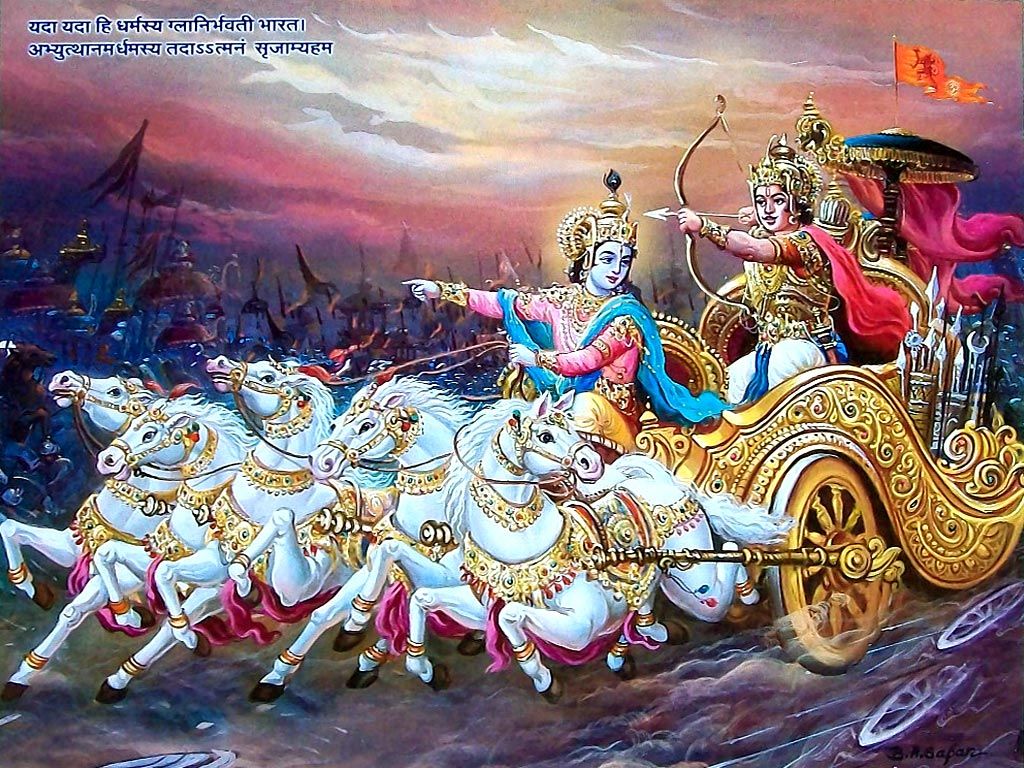Relevance of the Bhagavadgita to Humanity : 18-3. - Swami Krishnananda.
=============================================================
=============================================================
Monday, January 31, 2022. 19:00.
The First Six Chapters of the Bhagavadgita
Spoken on Bhagavadgita Jayanti).
Chapter 18: Reconciling Knowledge and Action 3.
=============================================================
 |
| Bhagawan Sri Krishna |
However, the point that we are made to understand here is that the world is not made up of material substances, and also it is not made up of located objects here and there, spread out like items in a zoo or a museum. It is a difficult to understand position of every inch of movement conditioning every other spread-out form of that very same energy. The Bhagavadgita tells us that when we conceive of ourselves in our relation to reality in the degrees of expression of which it is capable, we have to understand that the nearer we go to it, the better it is for us. The nearness here consists in the proper and adequate conception of it, the inwardisation of it in the proper sense of the term, and the reaction in respect of it as would be befitting its true nature, not in terms of the appearance which it tries to put on in its phenomenal presentation through the web of space and time.
Thus, matter is not reality. Hence, material possessions are not a safe value in our life. Therefore, we are very, very foolish in imagining that materially possessed people are rich people really. They can be dispossessed more easily than those who are not so possessed. The rich man has a greater danger of falling into oblivion and sorrow than the person who is not so materially rich. Thus, sacrificial offerings may be of a material character such as charity of money or gifts of material value, which are good enough, but they are poor in comparison with subtler values, which are the real values.
Human life is not a material existence. Likewise, any existence is not finally material. We are not physical bodies. We may be physically well fed, but we may be deprived of every other value in life. We would find this life to be equal to death. Each one can think of this matter for one's own self. Let us imagine that we are physically well placed but mentally completely deranged, socially kicked out and put in a state of utter insecurity. We do not know where we stand, yet we are fed well, robust, and we have material wealth to burn. We will find that all this material wealth will not count if other values are taken away from us. Self-respect is also a value which cannot be seen. It is not a substance. People hang themselves for want of self-respect. They jump into wells; they kill themselves merely because they have lost recognition in society, which is a chimera, actually speaking, a word, an idea, a notion which cannot be seen with the eyes. The loss of an unseen so-called self-respect can kill a person, in spite of all the physical wealth and the mountain-like gold that one may have. Even in our day-to-day existence we see that material values do not count much, and our value is to the extent of the comprehension of reality with which we are endowed. Therefore, knowledge is superior to material values. Dravya yajna is good, but jnana yajna is greater.
Now, here again we have to properly understand what is meant by ‘knowledge'. It is not a professor's learning that we are speaking of here. Just as values in life do not mean a material collocation of substances and relations with them, knowledge does not mean acquaintance with information of the structure of the outer world. Today, unfortunately, that is called education. We have only information of the existence of things, but not contact with things. We may know how many kilometres the sun is away from us, we may know its diameter, we may know its intensity of heat and the physical reaction it produces; nevertheless, we have no control over the sun. It is as it was. We may know the length and breadth of the cosmos, but it matters little for our daily life. And our learning today of a professorial and academic type is far away from the personal life of the person who seems to be acquainted with it or possessed of it.
To be continued ....
===============================================================








Comments
Post a Comment